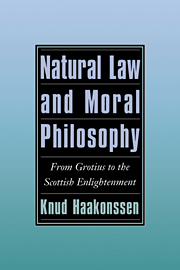Book contents
- Frontmatter
- Contents
- Acknowledgements
- Introduction: The Scottish Enlightenment in the history of ideas
- 1 Natural law in the seventeenth century
- 2 Natural law and moral realism: The civic humanist synthesis in Francis Hutcheson and George Turnbull
- 3 Between superstition and enthusiasm: David Hume's theory of justice, government, and politics
- 4 Adam Smith out of context: His theory of rights in Prussian perspective
- 5 John Millar and the science of a legislator
- 6 Thomas Reid's moral and political philosophy
- 7 Dugald Stewart and the science of a legislator
- 8 The science of a legislator in James Mackintosh's moral philosophy
- 9 James Mill and Scottish moral philosophy
- 10 From natural law to the rights of man: A European perspective on American debates
- Bibliography
- Index
Introduction: The Scottish Enlightenment in the history of ideas
Published online by Cambridge University Press: 05 June 2012
- Frontmatter
- Contents
- Acknowledgements
- Introduction: The Scottish Enlightenment in the history of ideas
- 1 Natural law in the seventeenth century
- 2 Natural law and moral realism: The civic humanist synthesis in Francis Hutcheson and George Turnbull
- 3 Between superstition and enthusiasm: David Hume's theory of justice, government, and politics
- 4 Adam Smith out of context: His theory of rights in Prussian perspective
- 5 John Millar and the science of a legislator
- 6 Thomas Reid's moral and political philosophy
- 7 Dugald Stewart and the science of a legislator
- 8 The science of a legislator in James Mackintosh's moral philosophy
- 9 James Mill and Scottish moral philosophy
- 10 From natural law to the rights of man: A European perspective on American debates
- Bibliography
- Index
Summary
The Scottish Enlightenment
The essays that make up this volume were written as more or less self-contained pieces, yet each is closely related to the rest. The unifying theme is that important parts of eighteenth-century moral philosophy were heavily influenced by the natural law theories that developed within Protestantism after Hugo Grotius. The general thesis is that Protestant natural jurisprudence harboured a tension between a natural rights and a natural law tendency and that this was of particular importance for much subsequent moral and political thought. This was especially true of moral philosophy in the Scottish Enlightenment. After an extensive survey of the seventeenth-century European natural law background, the argument therefore concentrates mainly on Scottish moral thought in the eighteenth century.
It has long been a commonplace that the thinkers of the Scottish Enlightenment understood the moral life and moral institutions of humanity in social and historical terms; in fact, they have been seen as pioneers of holistic methods of explanation and of historical sociology. Yet at the same time, the Scots have commonly been included in the roll of honour for the founders of liberalism, and this individualistic perspective was perhaps reinforced by the tendency of traditional history of philosophy to concentrate on the epistemic and moral powers of an abstract subject. This scene has been changed dramatically in less than a generation. Of the many perspectives that have enriched our understanding of the Scottish Enlightenment, three stand out: that of practical morals and moralizing politics; that of natural jurisprudence; and that of scientism.
- Type
- Chapter
- Information
- Natural Law and Moral PhilosophyFrom Grotius to the Scottish Enlightenment, pp. 1 - 14Publisher: Cambridge University PressPrint publication year: 1996



